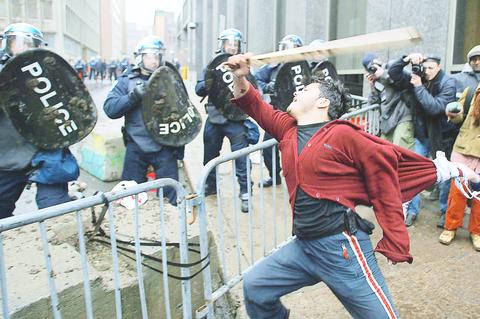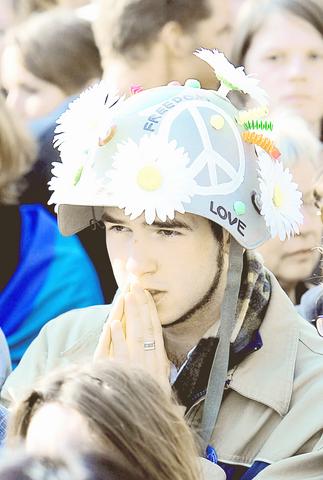Demanding an immediate end to the war in Iraq, tens of thousands of people marched in cities around the world or demonstrated outside US military bases, but the demonstrations were far smaller than recent protests.
"Bush, murderer," chanted protesters in Paris Saturday, while protesters in Helsinki, Finland roared, "George Bush, CIA, how many kids did you kill today?"

PHOTO: AP
Organizers said there had not been much time to plan protests, but there was little sign of people responding to calls to pour into the streets or responding spontaneously to the start of war. Despite large turnouts in some cities Saturday, the mostly peaceful marches were dwarfed by anti-war protests Feb. 15, which saw some of the largest demonstrations in history.

PHOTO: AP
In the African nation of Sudan, anti-riot police reportedly shot dead a 19-year-old university student during a protest in the capital, Khartoum, his cousin said. Police were not immediately available for comment.
Jaakko Kartano, a student at a march in Helsinki, Finland, said, "People ask what's the use of this, but our task is to instill faith in people and try and prevent anything like it [the war] happening again."
There was a sense of frustration among marchers in London. The turnout was well down from last month's mass rally, which drew at least 750,000 people, with police estimating turnout Saturday at 200,000.
Many protesters said they did not expect British Prime Minister Tony Blair or US President George W. Bush to listen to them.
"I don't think there is a snowball's chance in hell this march will stop the war but it's going to send out a message to next time, maybe," said Ernie Vandermass, a student who marched in London.
Protests would grow as the war continued, organizers said.
In the US, anti-war activists marched in dozens of cities, marshaling well over 100,000 in Manhattan.
Tens of thousands protested in San Francisco after two days of anti-war rallies in which about 2,200 were arrested.
Supporters of the war marched too, often by the thousands, with American flags and chants of "USA!" An estimated 15,000 pro-military demonstrators crammed shoulder-to-shoulder, prayed, and sang patriotic songs in Auburn, Indiana.
In Europe there were dozens of demonstrations involving tens of thousands of people in Britain, France, Germany, Finland, Italy, Sweden, Norway, Denmark and other countries.
A few radicals scuffled with police on the fringes of some demonstrations and there were scattered arrests.
In the Spanish capital Madrid, police fired rubber bullets to disperse protesters for the second day running. In Barcelona, police said 150,000 protested, while town hall officials estimated up to half a million.
Dozens of protesters hurled rocks and paint at police who used tear gas and dogs to stop them from reaching the US embassy in Oslo, Norway.
About 90,000 people marched in Paris, police said. French protesters singled out the McDonald's fast food chain as a symbol of American influence, with protesters pelting rocks at a restaurant in Strasbourg and others bursting into a McDonald's in Lyon.
Police said 30,000 people marched in Bern, Switzerland, where organizers estimated between 40,000 and 50,000.
In Berlin, about 40,000 protested and one placard declared "Dresden 1945, Baghdad 2003: The same crime" -- a reference to the Allied firebombing of the eastern German city at the end of World War II.
In Asia, the largest demonstrations were in Indonesia, the world's most populous Islamic nation, but only a few thousand people took part, some burning US flags and photos of Bush.

CHAOS: Iranians took to the streets playing celebratory music after reports of Khamenei’s death on Saturday, while mourners also gathered in Tehran yesterday Iranian Supreme Leader Ayatollah Ali Khamenei was killed in a major attack on Iran launched by Israel and the US, throwing the future of the Islamic republic into doubt and raising the risk of regional instability. Iranian state television and the state-run IRNA news agency announced the 86-year-old’s death early yesterday. US President Donald Trump said it gave Iranians their “greatest chance” to “take back” their country. The announcements came after a joint US and Israeli aerial bombardment that targeted Iranian military and governmental sites. Trump said the “heavy and pinpoint bombing” would continue through the week or as long

TRUST: The KMT said it respected the US’ timing and considerations, and hoped it would continue to honor its commitments to helping Taiwan bolster its defenses and deterrence US President Donald Trump is delaying a multibillion-dollar arms sale to Taiwan to ensure his visit to Beijing is successful, a New York Times report said. The weapons sales package has stalled in the US Department of State, the report said, citing US officials it did not identify. The White House has told agencies not to push forward ahead of Trump’s meeting with Chinese President Xi Jinping (習近平), it said. The two last month held a phone call to discuss trade and geopolitical flashpoints ahead of the summit. Xi raised the Taiwan issue and urged the US to handle arms sales to

State-run CPC Corp, Taiwan (CPC, 台灣中油) yesterday said that it had confirmed on Saturday night with its liquefied natural gas (LNG) and crude oil suppliers that shipments are proceeding as scheduled and that domestic supplies remain unaffected. The CPC yesterday announced the gasoline and diesel prices will rise by NT$0.2 and NT$0.4 per liter, respectively, starting Monday, citing Middle East tensions and blizzards in the eastern United States. CPC also iterated it has been reducing the proportion of crude oil imports from the Middle East and diversifying its supply sources in the past few years in response to geopolitical risks, expanding

An Emirates flight from Dubai arrived at Taiwan Taoyuan International Airport yesterday afternoon, the first service of the airline since the US and Israel launched strikes against Iran on Saturday. Flight EK366 took off from the United Arab Emirates (UAE) at 3:51am yesterday and landed at 4:02pm before taxiing to the airport’s D6 gate at Terminal 2 at 4:08pm, data from the airport and FlightAware, a global flight tracking site, showed. Of the 501 passengers on the flight, 275 were Taiwanese, including 96 group tour travelers, the data showed. Tourism Administration Deputy Director-General Huang He-ting (黃荷婷) greeted Taiwanese passengers at the airport and